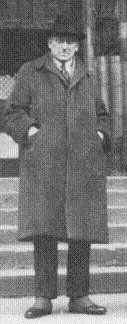
Between the two World Wars, a theology professor in France was advised by a Parisian pastor to visit Auguste Lecerf who, the pastor’s words, was ‘the last of the Calvinists’.
By 1872 higher criticism from the German universities had spread to the ecclesiastical descendants of Jean Calvin. But Auguste Lecerf (1872-1943) proved to be not only ‘the last’, but also ‘the first’ of modern French Calvinists.
A desire to find God
Lecerf, in fact, had no French blood in his veins. The illegitimate son of a Scottish nobleman, he was born in London into an unbelieving, partially Jewish, family. His mother was half Italian, half English.
Auguste lived in England before his parents returned to Paris. A childhood desire to find God led him to read the Bible and he was converted through reading Romans 9-11.
A few years later he purchased a copy of Calvin’s Institutes and became a Calvinist whilst still a teenager.
He studied at the Protestant Theological Faculty (PTF) in Paris, a seminary dominated by liberalism and founded to counterbalance the Evangelical Reformed seminary in Montauban.
Over the next three decades, Lecerf served as pastor to congregations in Normandy and Lorraine, as a chaplain in World War I, and then as a translator for the French Bible Society in Paris.
Linguistic gifts
Lecerf’s linguistic gifts were such that he was invited to teach Greek and English part-time at the PTF. For years, he also taught students an unofficial course of Calvinistic doctrine on Friday afternoons.
Eventually, the liberals running the Faculty had to recognise his obvious talent, and he was appointed Professor of Dogmatics at the age of 64. He laboured in that position until his death in 1943, brought about partly by the deprivations of the German occupation.
Lecerf founded the Calvinistic Society of France and was the first editor of its Bulletin. He figured prominently in Reformed circles in the 1930s, and was influenced theologically by Abraham Kuyper and Herman Bavinck.
Lecerfe’s legacy
Through Lecerfe’s Paris students there was a resurgence of French Calvinism. One former student, Pierre Marcel, became professor at the PTF, and earned the dubious distinction of being its first professor to be turned down by the National Synod. He was too Calvinistic! His La Revue Réformée took over the earlier Bulletin.

Jean Cadier and Pierre Petit became professors at Montpellier to where the Evangelical Montauban Faculty had moved. Courthial and Gonin, former students, were founding professors of the Reformed Theological Faculty in Aix-en-Provence.
During the past 25 years, over 300 students have graduated from Aix, to serve as pastors in France or elsewhere.
Aix also sponsors ‘Editions Kerygma’, which publishes Calvin’s works. Aix hosts theological conferences and has an excellent library, which holds the papers of Auguste Lecerf.
La Revue Réformée has been edited, since Marcel’s death, by Paul Wells, Professor of Dogmatics at Aix.
Evangelical Reformed Churches
In 1938, two Reformed denominations, one more liberal and the other more evangelical, merged as the Reformed Church of France (ERF). Ironically, Lecerf was a minister in the former.
A minority of the Evangelical denomination continues to this day as the Evangelical Reformed Churches of France.
In the ERF, 40 congregations are served by an equal number of ministers. Most of these churches are in the south of France, with a group in the Paris area planted by missionaries over the past thirty years.
This denomination decided to ordain women as ministers in the mid-1990s and is experiencing great internal friction. Several pastors in the ERF are Reformed in theological outlook, although the denomination is quite pluralistic.
Perspectives Réformées

About 30 years ago, The ‘Back to God Hour’ of the Christian Reformed Church of North America approached Aaron Kayayan, then pastor of the Belleville Reformed Church in Paris, to develop a broadcast ministry in the French language.
Kayayan relocated to Palos Heights, Illinois, where he produced many radio programmes, some television broadcasts, and a series of books on a wide variety of topics, under the imprint ‘Perspectives Réformées’. The response has been encouraging throughout the French-speaking world, particularly in Africa.
Mr Kayayan has been a key player in the emergence of a Confessing Reformed Church in the Congo, working there with the (German) Reformed Church of USA. Rev. Kayayan retired in the mid-1990s and was replaced by an African preacher.
Missionary efforts
The Presbyterian Church in America (PCA) has families working in France with the Evangelical Reformed Churches. Their teams target the three largest French cities: Paris, Lyon and Marseilles.

Since 1988 the Reformed Presbyterian Churches of Ireland and Scotland have had several missionaries in Nantes, the largest city in the Loire valley. Missionaries find France an exceptionally difficult field, as do native Christians.
Problems
It must be admitted that the movement described above is relatively small and fragile. The heady days of the 1930s have passed, mainly for four reasons.
Firstly, neo-orthodoxy, which Lecerf did not at first recognise as dangerous, has diverted many to Barthian heterodoxy.
Secondly, the Second World War brought an end to Reformed publishing and meetings just when the movement needed to be consolidated.
Thirdly, it centred too much on its leader, Auguste Lecerf, rather than on his Calvinistic principles.
Fourthly, Lecerf failed to remain consistently Reformed, notably in his doctrine of the church.
Nonetheless, Lecerf’s accomplishments were real. To this day their influence is discernable, both in France and beyond




